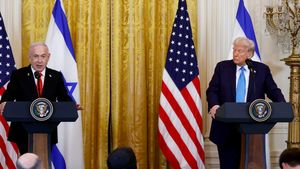Former President Donald Trump has once again stirred international trade tensions, this time directing his ire toward the BRICS nations, which include Brazil, Russia, India, China, and South Africa. At a recent event where he formally signed executive orders, Trump made headlines not only for his controversial economic policies but also for mistakenly listing Spain as one of the BRICS countries. "Spain has very low defense spending. And, by the way, it's a BRICS country, right? Spain is BRICS," he stated, showcasing the confusion surrounding the organization, according to reports from РИА Новости.
Trump's statements reflect his administration's long-standing apprehension toward the BRICS alliance, which has increasingly sought to challenge the dominance of the U.S. dollar. Specifically, Trump threatened to impose tariffs of at least 100% on goods traded with the BRICS countries, should they proceed with plans to develop their own currency. He warned, "If they create this new currency and they refuse to trade using the dollar, we're going to retaliate." This remark has sparked discussions about the trade relations between the U.S. and BRICS nations, as well as concerns about the potential disruption of the U.S. economy.
According to Trump, the current trade deficit between the European Union and the United States amounts to $300 billion, significantly impacting the American economy. His threats come on the heels of the BRICS members exploring alternative payment systems aimed at reducing dependence on the U.S. dollar for international transactions. The Russian Deputy Foreign Minister and BRICS sherpa, Sergey Ryabkov, noted the feasibility of creating BRICS payment mechanisms, insisting this move is not aimed at completely replacing the dollar but rather providing countries with alternatives should traditional channels falter.
Despite the heated rhetoric from Trump, he does not view BRICS as an outright threat but emphasizes the need for the U.S. to maintain its influence on the global economic stage. "I don't believe they are posing any threat right now, but if they go forward with this new currency, things could change dramatically," Trump articulated during the signing event. His administration’s policies have often leaned toward protectionism, seeking to bolster domestic industries at the cost of international cooperation.
Following Trump’s threats, the New Development Bank, which serves the BRICS nations, affirmed its support for funding projects within Russia. Recently, they allocated $1.2 billion for projects, showing resilience against U.S. sanctions and continued commitment to collaboration among member nations. This funding is significant, especially as it resumes after being paused due to previous sanctions directed at Russia.
The BRICS nations are positioning themselves to explore additional financial systems to minimize the impact of sanctions, echoing sentiments similar to those expressed by many nations seeking to establish economic independence from U.S. influence. A potential new currency could change the dynamics of international trade, and how it evolves will hinge on responses to policies initiated from Washington.
Trump's aggressive stance reflects the growing tensions among global economic powers as nations explore new avenues for trade and financial cooperation. With countries like China and Russia advocating for reduced reliance on the dollar, the BRICS collective's plans could mark a significant shift away from long-standing monetary policies. Such developments have raised eyebrows among economists and policy-makers internationally, questioning the long-term stability of U.S. economic dominance.
Observers have pointed out the irony of the situation: as Trump calls for 100% tariffs to push back against BRICS financial maneuverings, member nations' collaboration appears to strengthen, countering U.S. efforts. The scenario paints a complex picture of international relations where economic strategies are vulnerable to political volatility.
The potential creation of a BRICS currency showcases the coalition's ambition to assert its financial footprint globally. Each decision taken by these nations will undoubtedly affect the global balance and influence the future conduct of finance and trade practices worldwide.
Can the BRICS nations succeed where others have faltered? Only time will tell. But if they do, it could herald the onset of a new era of international finance—one where American policy could no longer dictate terms alone.



